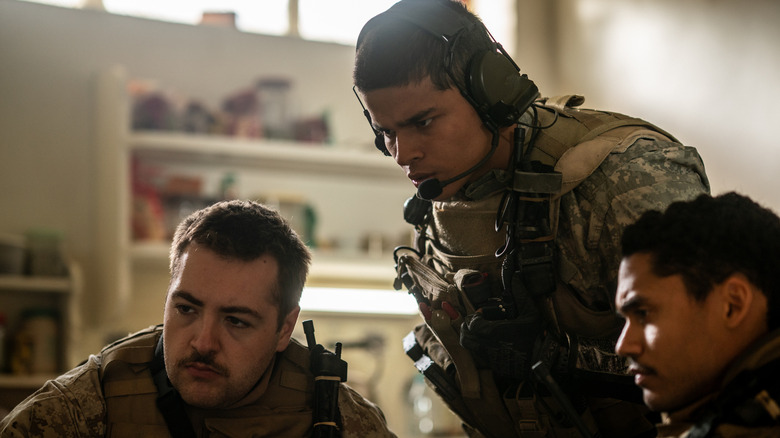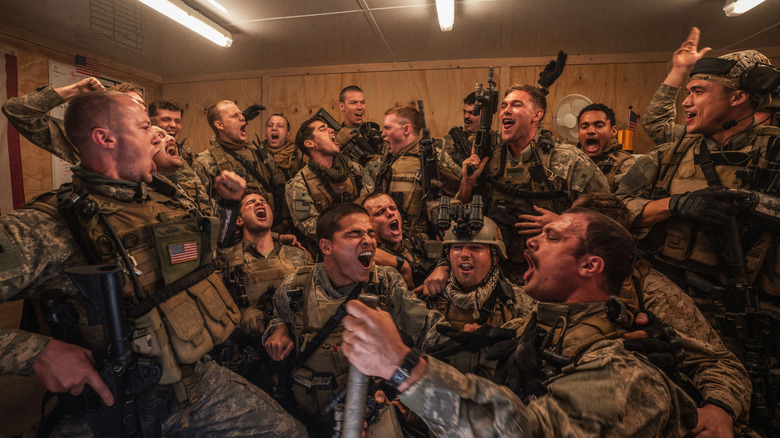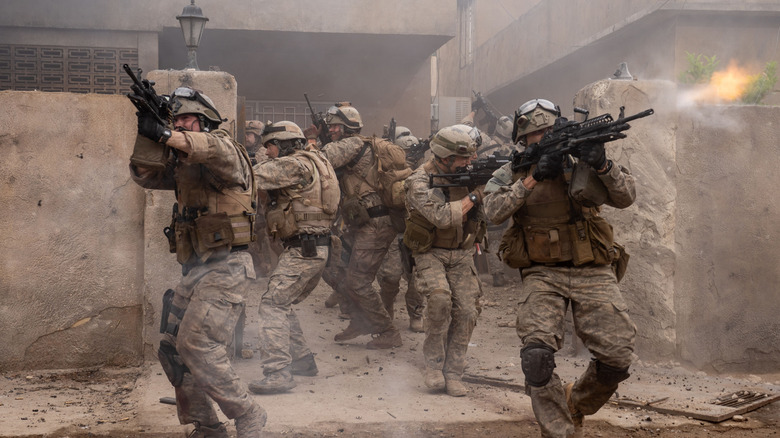Warfare Review: Less Messy Than Civil War, But Also Less Interesting
- Feels extremely realistic
- Immersive sound design
- Zero characterization
- Lack of context is questionable
"Warfare" came about as a result of conversations on the set of "Civil War" between director Alex Garland and military advisor Ray Mendoza. Mendoza had long wanted to make a movie about one particularly intense mission he took part in as a NAVY Seal during the Iraq War, and so Garland decided to help him make that movie as co-directors. Though "Civil War" is science fiction and "Warfare" is based entirely on the memories of Mendoza and his fellow soldiers, they share a filmmaking approach prioritizing the immediate visceral experience of war over questions of broader context.
"Civil War" was a messy movie that I generally liked. Its science fiction set-up could be vague in parts and silly in others, but it was thought-provoking and had some startlingly perceptive observations about the nature of journalism. "Warfare" is in some ways the better-made movie — its dedication to realism and authenticity prevents the lapses in logic one could criticize its predecessor for — but it's also a movie that I found a lot less interesting. It accomplishes what it sets out to do in showing what 90 minutes of modern warfare feels like, but to what end exactly?
The film prioritizes physical pain over character depth
The cast of "Warfare" is stacked with basically every up-and-coming twunk A24 could afford, including D'Pharaoh Woon-A-Tai ("Reservation Dogs"), Will Poulter ("Death of a Unicorn"), Cosmo Jarvis ("Shōgun"), Joseph Quinn ("Stranger Things"), Kit Connor ("Heartstopper"), Noah Centineo ("To All the Boys I've Loved Before"), Michael Gandolfini ("Daredevil: Born Again"), and Charles Melton ("May December"). I could barely tell you a thing about any of the characters they play. The only names I remembered leaving the theater were Ray (Woon-A-Tai), since he's the co-director, and Elliot (Jarvis), since he gets the film's closing dedication. The only specific performance detail I could describe is that Joseph Quinn is excellent at screaming. There's no time to get to know anyone.
The film opens with one moment of fraternal bonding — the last time we'll hear music until the credits — before going straight to the mission. For the first half hour or so, everything's quiet. The SEALs hide in an Iraqi family's house, conversing in technical jargon and aiming sniper rifles out the windows while patiently waiting for the right time to shoot. Then the fighting breaks out, and we're suddenly paying attention to multiple streams of noise in different directions; you feel the vibrations of each round of gunfire in your IMAX seat. And then an IED goes off, and it's the loudest thing you've ever heard. I criticized the sound design of "Civil War" as excessive, but in "Warfare," it's exactly the point — in lieu of forming traditional narrative attachments to any of the characters, the audience is placed directly in the experience of war, and that experience is physically painful.
Based on the trailers and bad experiences with other movies about the Iraq War, some feared that "Warfare" would be military propaganda. I doubt that's the intention here. It appears the production forwent the Department of Defense backing that many movies about the U.S. military seek out, and it doesn't depict its mission with any sense of pomp. The real-time approach helps with the de-glorification; lingering on every single step of caring for men enduring grotesque injuries should make the horror stick in the brain and overwhelm any potential excitement. I can't confidently say that everyone will take away an anti-war message from it – François Truffaut famously argued "There's no such thing as an anti-war film," and media literacy in America is so bad there are people who seriously thought Homelander (Antony Starr) was the good guy in "The Boys" – but at least it's safe to say recruitment officers won't be using this movie.
Who was this made for?
While "Warfare" is successful in showing that war is Hell, the question remains: who will want to watch this movie? It has almost zero entertainment value, which is understandable in light of the dead seriousness of its subject matter, but movies that aren't trying for entertainment have to provide some other sort of insight, and I'm not sure "Warfare" offers enough to be particularly interesting. As a warning for 18-year-olds thinking about enlisting, it should have an impact, but anyone who's already internalized the "war is Hell" message will have little reason to buy a ticket.
The lack of character development blunts any potential for the deeper emotional impact found in the best war movies. The lack of political contextualization further limits how much the film is really capable of saying. For his part, Alex Garland defended the lack of context during the Q&A following the press screening I attended, saying, "If you need context, the context is f*cking history." Maybe that's fair, but it's also fair to question whether including more "f*cking history" would make for a more meaningful experience. And on the propaganda question, while "Warfare" isn't pro-war, it's yet another war centered on the pain of American soldiers rather than that of the people in the countries they invaded. Only one minute at the end shifts gears to foreground Iraqi perspectives, and I have to wonder if that movie would feel more revelatory.
So who is "Warfare" actually for? The dedication answers that: it's for Elliot, who suffered such a serious concussion in the mission depicted that he couldn't actually remember the mission itself. "Warfare" exists as Ray Mendoza's way of helping his friend remember. And yeah, that's actually a really powerful reason to make a movie like this. Art made for a target audience of one person still has value, and while I am decidedly not even close to that target audience, I have to respect it.
"Warfare" opens in theaters on April 11.


